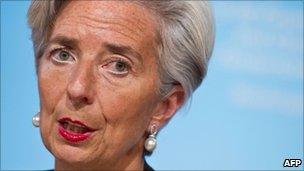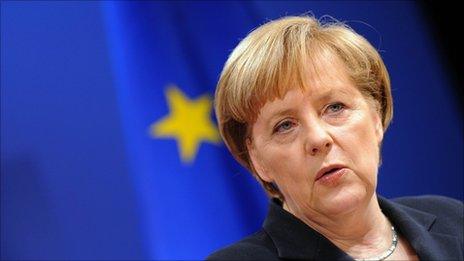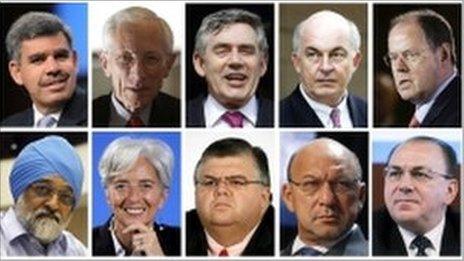New IMF chief, old rules of the game
- Published
- comments
It's not a done deal that a European will replace Dominique Strauss-Kahn as head of the IMF, but if Christine Lagarde formally threw her hat into the ring, my understanding is that her candidacy would be hard to beat.
As I said on Today, external this morning, it's awkward for the Europeans and the US because this time was supposed to be different.
The rise of the G20 and the reorganisation of votes in the World Bank and IMF to give more power to the Bric countries (Brazil, Russia, India and China) was supposed to come with a more "open" and "merit-based" approach to hiring the heads of these global institutions. And "open" in this context was supposed to mean "not European".

Christine Lagarde is seen as a leading candidate for the IMF's top job
That is the message of a letter sent to G20 colleagues by the Brazilian finance minister yesterday, in effect, warning against a stitch up by the US and Europe. The emerging world can also point to several strong candidates for the job - such as Agustin Carstens, the Mexican Central Bank governor who has spent a good chunk of his career in Washington, and Kemal Dervis, the former Turkish finance minister and UNDP chief.
But the reform of the voting system has not done anything to prevent the US and Europe forming a blocking majority. If Europe can get the Americans on their side, then another European will replace Mr Strauss-Kahn.
Though they are sensitive - rather more sensitive - to the demands of the emerging world, the Americans also have to be sensitive of the fact that Congress will not continue to support the World Bank if America loses the top job there. The US is unlikely to get European support for another American to replace the current World Bank president, Bob Zoellick, if America refuses to back a European for the IMF now.
All of which is to say, we have all the ingredients of another stitch-up. But this time, the Europeans do at least have practical necessity on their side as well as an undeserved but traditional sense of entitlement.
When people talked about an "open and transparent" process two years ago, the IMF didn't have three active programmes in Europe.
As I said on Monday, the international community were preparing to find a replacement for Mr Strauss-Kahn anyway, when and if he had decided to run for president in France. In that sense, his shocking arrest is more important for France than for the IMF or the crisis in the eurozone. But, even if his exit was broadly anticipated, it still leaves a massive hole.
The past two years have confirmed that eurozone leaders don't have good mechanisms for coming up with solutions to crises - and those that they do have tend to move very slowly.
Frenchmen have traditionally made good IMF chiefs. (All the duff ones, in recent years, have been from other parts of Europe.) But even by past standards, Mr Strauss-Kahn was exceptional, and exceptionally well-suited to the time.
There are lots of people inside the Fund who can speak the language of current and capital account crises and fiscal adjustment. There aren't so many - inside or outside the institution - who can do that while also speaking the language of European politics and engaging, as an equal, with European leaders. Mr Strauss-Kahn could do all that at a crucial time.
President Sarkozy will perhaps be relieved to have Mr Strauss-Kahn out of the way. But the French are just as spooked by the financial crisis as anyone else, and he has his work cut out winning the trust and respect of German Chancellor Angela Merkel.
Would it help him, or the eurozone, to have Christine Lagarde at the IMF? Quite possibly. She has the gravitas and experience at the top table which other candidates - including Philip Hildebrand, the Swiss central bank governor the Germans are thinking about supporting - do not have.
To return to where I began - the emerging market economies will put up a strong fight, but under the circumstances a Lagarde candidacy would be hard to stop. And the fact that she's a woman doesn't hurt one bit.
Update 14:50: Axel Weber's name is doing the rounds as Chancellor Merkel's preferred candidate for the IMF job. Having spent the past two days talking to European officials in Brussels, my sense is that she is not thrilled by the idea of Lagarde taking the job, and has been persuaded that Axel Weber is the only person with a CV that stands comparison with the French finance minister's.
As I said earlier, the Swiss central banker, Philipp Hildebrand, has some support in Germany, and he is well known in Washington circles. But he is young and relatively untested, and might not be helped by his time in New York at the hedge fund, Moore Capital.
Axel Weber is more of a heavyweight, who has been a familiar figure on the international financial circuit for many years as head of the Bundesbank. He also, from Germany's perspective, has the advantage of being a traditionalist when it comes to little matters like inflation and budget deficits. If you think the IMF needs a firm hand on the purse strings after a period of throwing a lot of money at the financial crises, Weber is the man for you.
But, even with these advantages, Chancellor Merkel knows that Axel Weber would be a very hard sell, and not just to the emerging market economies who want a non-European. Weber is somewhat lacking in diplomatic skills and inspires a lot of mixed feelings in Washington - especially when compared with Lagarde.
If Merkel knows she can't win, experience suggests she will not want to publicly put her weight behind Weber. But the Americans are sensitive to Germany's feeling that France has had the job too often - and there is bad blood on this issue dating back to the late 1990s, when the Americans blocked Germany's first choice for the job.
All of which is to say... this is still very much up in the air.
- Published19 May 2011

- Published20 May 2011
